Top Rankings
Herman-Norcross School District ranks among the top 20% of public school district in Minnesota for:
Category
Attribute
Student Attention
Lowest student:teacher ratio (Top 1%)
For the 2025 school year, there is 1 public middle school serving 44 students in Herman-Norcross School District. This district's average middle testing ranking is 3/10, which is in the bottom 50% of public middle schools in Minnesota.
Public Middle School in Herman-Norcross School District have an average math proficiency score of 30% (versus the Minnesota public middle school average of 39%), and reading proficiency score of 30% (versus the 49% statewide average).
Minority enrollment is 14% of the student body (majority Hispanic), which is less than the Minnesota public middle school average of 38% (majority Black and Hispanic).
Overview
This School District
This State (MN)
# Schools
2 Schools
1,003 Schools
# Students
103 Students
272,988 Students
# Teachers
14 Teachers
17,811 Teachers
Student : Teacher Ratio
7:1
7:1
District Rank
Herman-Norcross School District, which is ranked within the bottom 50% of all 522 school districts in Minnesota (based off of combined math and reading proficiency testing data) for the 2021-2022 school year.
The school district's graduation rate of 50% has decreased from PS% over five school years.
Overall District Rank
#400 out of 527 school districts
(Bottom 50%)
(Bottom 50%)
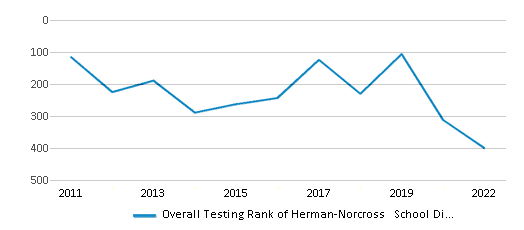
Math Test Scores (% Proficient)
30-39%
45%
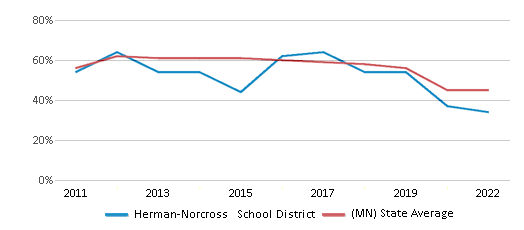
Reading/Language Arts Test Scores (% Proficient)
20-29%
51%
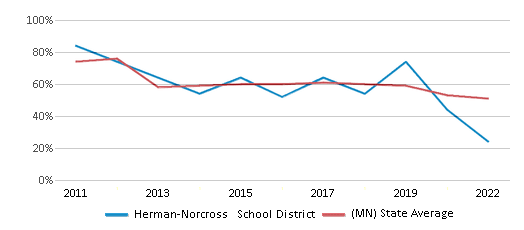
Science Test Scores (% Proficient)
20-29%
41%
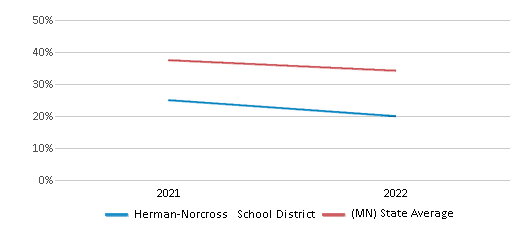
Graduation Rate
≥50%
84%
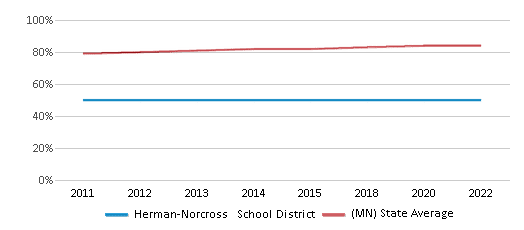
Students by Ethnicity:
Diversity Score
0.22
0.59
# American Indian Students
2 Students
6,086 Students
% American Indian Students
2%
2%
# Asian Students
n/a
17,993 Students
% Asian Students
n/a
7%
# Hispanic Students
4 Students
30,064 Students
% Hispanic Students
4%
11%
# Black Students
n/a
32,798 Students
% Black Students
n/a
12%
# White Students
91 Students
169,010 Students
% White Students
88%
62%
# Hawaiian Students
n/a
306 Students
% Hawaiian Students
n/a
n/a
# Two or more races Students
6 Students
16,731 Students
% of Two or more races Students
6%
6%
Students by Grade:
# Students in PK Grade:
10
847
# Students in K Grade:
10
2,545
# Students in 1st Grade:
8
2,825
# Students in 2nd Grade:
6
2,938
# Students in 3rd Grade:
10
2,965
# Students in 4th Grade:
3
3,207
# Students in 5th Grade:
3
11,547
# Students in 6th Grade:
9
53,234
# Students in 7th Grade:
5
63,243
# Students in 8th Grade:
3
64,723
# Students in 9th Grade:
11
14,851
# Students in 10th Grade:
7
15,978
# Students in 11th Grade:
7
16,184
# Students in 12th Grade:
11
17,901
# Ungraded Students:
-
-
District Revenue and Spending
The revenue/student of $20,757 is higher than the state median of $17,854. The school district revenue/student has declined by 9% over four school years.
The school district's spending/student of $20,359 is higher than the state median of $18,580. The school district spending/student has declined by 9% over four school years.
Total Revenue
$2 MM
$15,547 MM
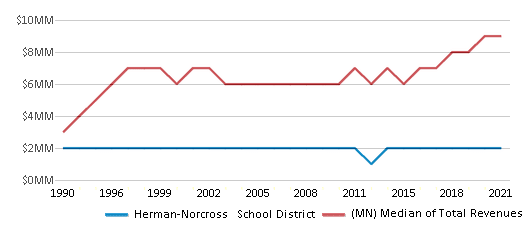
Spending
$2 MM
$16,179 MM
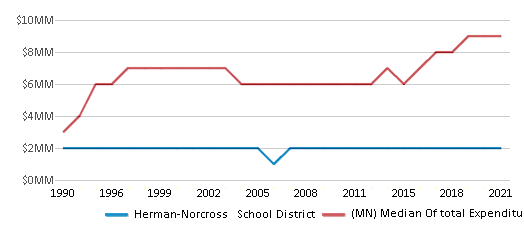
Revenue / Student
$20,757
$17,854
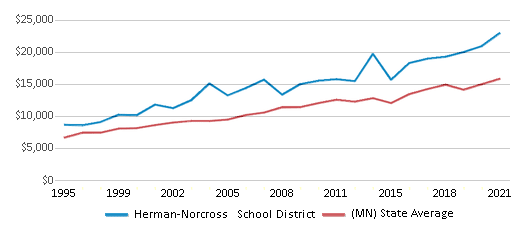
Spending / Student
$20,359
$18,580
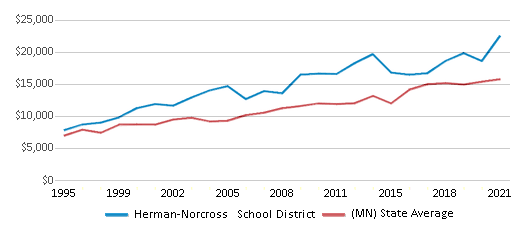
Best Herman-Norcross School District Public Middle Schools (2025)
School
(Math and Reading Proficiency)
(Math and Reading Proficiency)
Location
Grades
Students
Rank: #11.
Herman Secondary
(Math: 21-39% | Reading: 21-39%)
Rank:
Rank:
3/
Bottom 50%10
504 Lois Ave N
Herman, MN 56248
(320) 677-2291
Herman, MN 56248
(320) 677-2291
Grades: 7-12
| 44 students
Recent Articles

What Is A Charter School?
Explore the world of charter schools in this comprehensive guide. Learn about their history, how they operate, and the pros and cons of this educational innovation. Discover key facts about charter schools, including admission policies, demographics, and funding, as well as what to look for when considering a charter school for your child.

10 Reasons Why High School Sports Benefit Students
Discover the 10 compelling reasons why high school sports are beneficial for students. This comprehensive article explores how athletics enhance academic performance, foster personal growth, and develop crucial life skills. From improved fitness and time management to leadership development and community representation, learn why participating in high school sports can be a game-changer for students' overall success and well-being.

February 05, 2025
Understanding the U.S. Department of Education: Structure, Impact, and EvolutionWe explore how the Department of Education shapes American education, from its cabinet-level leadership to its impact on millions of students, written for general audiences seeking clarity on this vital institution.





